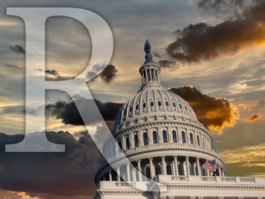Artificial Intelligence: 72% of Voters Are Concerned
As artificial intelligence (AI) becomes a significantly more important part of the U.S. economy and society, more than three-quarters of voters would support legislation to protect against AI’s potential threats to constitutional rights.
A new telephone and online survey by Rasmussen Reports and the Heartland Institute finds that 72% of Likely Voters are concerned about artificial intelligence, including 31% who are Very Concerned. Just 25% aren’t concerned about AI. (To see survey question wording, click here.)
Seventy-seven percent (77%) would support a state or federal law that would require developers and technology companies to design AI so that it protects the human rights contained in the Constitution, such as freedom of speech and freedom of religious expression, including 48% who would Strongly Support such legislation. Only 11% would oppose such a law, while another 12% are not sure.
“Americans are sending a clear message: AI must serve people, not rule over them,” said Donald Kendal, director of the Emerging Issues Center at the Heartland Institute. “Policymakers should ensure that AI systems are designed more like calculators – objective and neutral – not tools for ideological enforcement or social control. Without clear constitutional safeguards, AI risks becoming a threat to the very freedoms it ought to protect.”
(Not getting our eNewsletter? Sign up HERE. Already signed up? Try adding updates@rasmussenreports.com to your contacts or whitelisting us. Still having trouble – email subscriptions@rasmussenreports.com. If it's in the news, it's in our polls).
Rasmussen Reports updates are also available on Twitter or Facebook.
The survey of 1,067 U.S. Likely Voters was conducted on April 30-May 4, 2025 by Rasmussen Reports and the Heartland Institute. The margin of sampling error is +/- 3 percentage points with a 95% level of confidence. Field work for all Rasmussen Reports surveys is conducted by Pulse Opinion Research, LLC. See methodology.
While 33% of voters believe that over the next decade, artificial intelligence will be used more to empower individuals, 42% think AI will be used more to control people. Twenty-five percent (25%) are not sure.
Among other findings of the Rasmussen Reports/Heartland Institute survey of Likely Voters:
– Fifty-one percent (51%) would support allowing AI systems to have access to health records, financial data, and other personal data if it meant that AI would have a better chance at curing diseases and solving other social and economic problems, including 19% who would Strongly Support such access. Thirty-five percent (35%) oppose giving AI systems access to personal data, and 15% are not sure.
– Majorities of every political category – 74% of Democrats, 70% of Republicans and 72% of voters not affiliated with either major party – are at least somewhat concerned about artificial intelligence. Slightly fewer Democrats (38%) than Republicans (43%) or unaffiliated voters (46%) think AI will be used more to control people than to empower them.
– Majorities of every racial category – 81% of whites, 65% of black voters, 73% of Hispanics and 80% of other minorities – would support a state or federal law that would require developers and technology companies to design AI so that it protects the human rights contained in the Constitution. Black voters are most likely to be Very Concerned about artificial intelligence.
– If artificial intelligence eliminates millions of jobs over the next decade, 62% of voters would support a government program that taxes big technology companies and then uses the funds to provide every American with an income large enough to pay for basic necessities like housing, clothes, and food. Just 22% would oppose such a program, while 16% are not sure.
“This survey makes one thing clear: Americans are deeply uneasy about artificial intelligence and its potential to reshape the economy and society,” said Jack McPherrin, a Heartland Institute research fellow. “But perhaps the most revealing finding is how that fear is reshaping long-held ideological beliefs. A full 62 percent of likely voters – including 60 percent of self-identified conservatives – support a socialistic universal basic income program that would tax Big Tech companies and redistribute the funds to every American. That’s a stunning development, given that conservatives have long opposed socialism in all its forms.”
American voters overwhelmingly prefer the free-market economy to socialism, although younger voters are significantly less enthusiastic about the capitalist system.
Although fewer voters now have a negative view of how Congress is doing its job, a majority agree with a Republican congresswoman’s criticism of the GOP majority on Capitol Hill.
Additional information from this survey and a full demographic breakdown are available to the public as well as to Platinum Members.
Please sign up for the Rasmussen Reports daily e-mail update (it’s free) or follow us on Facebook. Let us keep you up to date with the latest public opinion news.
The survey of 1,067 U.S. Likely Voters was conducted on April 30-May 4, 2025 by Rasmussen Reports and the Heartland Institute. The margin of sampling error is +/- 3 percentage points with a 95% level of confidence. Field work for all Rasmussen Reports surveys is conducted by Pulse Opinion Research, LLC.
Rasmussen Reports is a media company specializing in the collection, publication and distribution of public opinion information.
We conduct public opinion polls on a variety of topics to inform our audience on events in the news and other topics of interest. To ensure editorial control and independence, we pay for the polls ourselves and generate revenue through the sale of subscriptions, sponsorships, and advertising. Nightly polling on politics, business and lifestyle topics provides the content to update the Rasmussen Reports web site many times each day. If it's in the news, it's in our polls. Additionally, the data drives a daily update newsletter and various media outlets across the country.
Some information, including the Rasmussen Reports daily Presidential Tracking Poll and commentaries are available for free to the general public. Subscriptions are available for $4.95 a month or 34.95 a year that provide subscribers with exclusive access to more than 20 stories per week on upcoming elections, consumer confidence, and issues that affect us all. For those who are really into the numbers, Platinum Members can review demographic crosstabs and a full history of our data.
To learn more about our methodology, click here.





